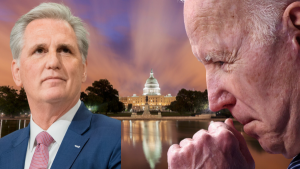Life, Liberty, Property #34: the congressional budget debate is really about the Uniparty versus the reform movement.
IN THIS ISSUE:
- The Real Subject of the Budget Debate Is the Uniparty
- Attorneys General vs. Judicial Tyranny
- CNN Mugged by Reality
- Cartoon
SUBSCRIBE to Life, Liberty & Property (it’s free). Read previous issues.
 The Real Subject of the Budget Debate Is the Uniparty
The Real Subject of the Budget Debate Is the Uniparty
The current debate over funding the federal government may indicate a move toward one of the most beneficial political phenomenon of the century thus far: the end of the Uniparty. Far from being business as usual, the 45-day stopgap bill passed by both houses of Congress on Saturday confirms this change.
The legislation includes two crucial elements that Republican budget hardliners wanted: a short timeframe that requires Congress to pass individual spending bills instead of a long-lasting continuing resolution (CR), and no further funding for the war in Ukraine. The bill did not include new funding for border security, which will remain a source of intense conflict in the Congress.
Only one House Democrat voted against the short-term budget deal, with 209 Democrats and 126 Republicans voting yes. Ninety Republicans voted no. The Senate approved it 88 to 9, with all the Democrats voting yes. The ability of the Republicans to draw full Democrat support for a bill that the Dems strongly opposed until hours before a potential government shutdown is notable and instructive.
The hardliners on the Republican side now resume budget negotiations with a stronger hand, having forced the Democrats to accept big concessions on the timeline and additional Ukraine war funding.
Republican budget hardliners such as Rep. Byron Donalds (R-FL) expressed anger at the compromise bill. “I think this is a terrible deal for the American people,” said Donalds, according to Fox News. They are renewing their threats to remove McCarthy from his position as Speaker. House Democrat leader Hakeem Jeffries (D-NY) said “the extreme MAGA Republicans have lost.”
This, too, is good news, as it represents continued tenacity among Republican budget hardliners. They see this win as being not nearly enough—and indeed it is not—and they are resolved to get more concessions from the Democrats. In politics, that is the only way to get what you want: to fight for it. They appear determined to continue the fight.
Although the press has been concentrating its attention on conflicts within the Republican caucus, the real story behind the brinksmanship over the federal budget is the threat to the Uniparty.
The latter is the longstanding game in which Republicans, whether in or out of power, invariably (and conservatively) give in to Democrats’ demands but hold back a small percentage of what the latter want and claim the result as a victory. This process creates the “socialist ratchet” by which conservatives cement progressives’ policies and make sure that the public pays for them. Conservatives thus get no credit for the changes and absorb the blame for the costs.
The differences between the spending plans being advanced by the narrowly Republican-controlled House of Representatives and narrowly Democrat-controlled Senate are important not so much because of the sums of money involved as for the differences in the view of government they represent.
To be sure, the money difference is impressive, with the House’s previously offered short-term plan, the Spending Reduction and Border Security Act, offering across-the-board spending cuts of approximately 30 percent in areas other than national defense, the Departments of Veterans Affairs and Homeland Security, and designated disaster relief. That is the plan from which the negotiations in the House will now proceed.
The difference between the two chambers’ visions of the federal government is even greater, and it reflects a chasm between the two parties and the voter blocs they represent.
The conflict within the Republican Party, in my view, has not been mainly about substantive matters, such as tax rates and funding levels, but about political strategy. Senate Minority Leader Mitch McConnell and his GOP colleagues in the upper chamber have always been intent on getting things done—being the responsible parties, the adults in the room, the people who avoid disasters such as government shutdowns are presumed to be. They are willing to work with Democrats to keep the government going. In short, they act as conservatives.
The increasingly bold budget hardliners in the House have been concentrating on establishing principles, short-term disruptions be damned. They are pushing to establish a view of government in stark opposition to that of President Joe Biden and the Democrats—offering an “America First” agenda represented by their firmness in establishing some border security and their steadfast refusal to send any more money to Ukraine, refusing to compromise not only with the Democrats but even with their fellow Republicans on these matters. The 30 percent spending cut indicates that the hard-liners’ vision of America First is based on private sector growth and the premise that the federal government is a net impediment to the production of goods and services in the nation. In short, they act as reformers.
The fact that Republicans have a majority in the House and not the Senate has an important effect. I think what it represents, however, is not that the House Republicans have the luxury of being able to dissent because they have the majority, whereas the Senate GOP does not.
I think that in fact the contrary is true: because the House GOP, having the majority, is responsible for whether bills pass through the chamber, the Republicans cannot escape responsibility for what those bills will do if they become law. That is not a luxury. If the Republicans pass big spending bills, they will own the consequences both in reality and in political terms. Hence, they must take the potential consequences quite seriously—and those consequences are driven by the principles behind the legislation.
The Republicans in the Senate, by contrast, can afford to compromise with Democrats because the latter will own the results. The fact that the corrupt media will spin the ultimate outcomes (in inflation, labor problems, and the like) in the Democrats’ favor provides further incentive for Senate Republicans to go along with them: the resulting laws will be widely described as amazingly beneficial, and the GOP remoras in the upper chamber can hope to get a few small scraps of approbation from the press. Those hopes will, of course, quickly be dashed, but the Republicans are always happy to avoid the storm of brimstone that results from sticking to principle when the other side is going to win anyway.
This difference in perspectives, in my view, can sufficiently explain why House Speaker Kevin McCarthy has tried so hard to keep the hardliners on board. Although McCarthy is understandably desperate to keep himself and his fellow Republicans from being characterized as recklessly shutting down the government, the Speaker’s job is to get legislation passed through the chamber. Neither he nor his party is tasked by the Constitution or common sense with ensuring that the Senate and president concur. The responsibility for what happens to legislation after it is passed by the House belongs with the Senate and the president.
On Friday, McCarthy indicated he understands that. “Asked about whether he could cut a deal with Democrats to keep the government open, he responded: ‘It’s easy to surrender if you want to surrender,’” The Wall Street Journal reported.
It’s plausible to characterize the current bill as a surrender by the Republicans. Ultimately, however, it is notable that the Democrats ended up biting the bullet and supporting the short-term compromise. It counts as progress whenever the big spenders have to give up anything.
The fact that the press will continue to blame McCarthy and the budget hardliners for the ongoing budget impasse is certainly an unpleasant prospect for them, but preemptive surrender would not have averted bad press for Republicans and never has done so. The Republicans are damned by the press whatever they do. In the House, at least, they are at present setting themselves up to be damned for doing right, which is much better than being damned for doing wrong.
Regardless of the ultimate outcome of this political battle over the budget, the shutdown conflict indicates that the foundations of the Uniparty are eroding because a small group of Republicans has finally decided to act as reformers instead of conservatives.
Sources: Fox News; Fox News; The Hill; The Wall Street Journal

Attorneys General vs. Judicial Tyranny
As cities across the country struggle to deal with hordes of homeless people bedding down on public property (and often on private property as well), governments in such Western states as Arizona, California, Idaho, Nevada, Oregon, and Washington have been hamstrung by court decisions preventing local governments from sheltering the homeless in places other than where the latter may choose to go.
That is what decisions such as the Ninth Appeals Court’s 2018 ruling in Martin v. City of Boise and 2023 judgment in Johnson v. City of Grants Pass have done, according to an amicus curiae brief filed by 20 GOP-state attorneys general supporting the petitioners in the latter case:
In 2018, the Ninth Circuit discovered an Eighth Amendment right to sleep, camp, and defecate in public spaces. Martin v. City of Boise, 902 F.3d 1031 (9th Cir. 2018), opinion amended and superseded on denial of reh’g, 920 F.3d 584 (9th Cir. 2019). The panel below went further and held the Eighth Amendment even prevents civil fines for “engaging in involuntary, unavoidable life sustaining acts.” Johnson v. City of Grants Pass, 72 F.4th 868, 895 (9th Cir. 2023).
The court was saying, in short, that the Eight Amendment codifies people’s right to poop wherever they want to. The nation’s founders really paid attention to detail.
The city of Grants Pass is petitioning the U.S. Supreme Court to set aside the Ninth Appeals Court’s rulings. “‘Does the enforcement of generally applicable laws regulating camping on public property constitute ‘cruel and unusual punishment’ prohibited by the Eighth Amendment?” lawyers for Grants Pass asked the nine justices in August,” The Epoch Times reports.
The amicus curiae brief describes the chaos that the 2018 ruling and appeals court’s upholding of it have unleashed on “over 65 million Americans and over 40% of the Nation’s land mass”:
Families can no longer walk the streets of Portland, San Francisco, and Seattle in safety. The pungent smell of urine and human feces fills the air. Hypodermic needles used for narcotics cover the ground. And rats carrying diseases that were once thought eradicated scurry from encampments to nearby businesses and homes. These cities used to be beacons of the West, but their sidewalks are now too dangerous to visit.
The appeals court’s decisions have created a public health disaster, the AGs note:
The increase in public encampments has led to surging public health and safety issues. Medieval diseases like typhus, shigella, and trench fever are spreading in public encampments. Rats and fleas plague these spaces and spread diseases to people and pets. They also infest nearby public buildings, placing all who enter at risk. [Footnote numbers omitted.]
The situation has gotten so bad that even the perennially silly Gov. Gavin Newsom of California has joined the conservative reaction and filed a brief supporting the petitioners in Grants Pass. The Epoch Times reports:
“I hope this goes to the Supreme Court, and that’s a hell of a statement for a progressive Democrat,” Mr. Newsom told Politico earlier this month. “It’s gone too far. People’s lives are at risk.”
These local laws dealing with homelessness are far from draconian, as their proponents note. In most cases, the homeless are being offered help, and none are being flogged and thrown into dungeons. The laws do not even constitute a conflict between rights: people have a right to their own property, and others may use it only with permission. This is true for public property as well as private holdings. Protecting property while being fair and humane toward violators is precisely what governments are supposed to be doing.
These laws are not cruel, are not unusual, and are not unduly punitive. They simply do not conflict with the Eighth Amendment.
In fact, the court rulings themselves constitute an unconstitutional incursion by the federal government into areas it is forbidden to enter. As the AGs note in their brief, the states have full authority in matters of what are called police powers, laws intended to keep the peace and maintain order within their borders:
Their core sovereign functions involve defining crimes and enforcing a criminal code within their borders. But the Ninth Circuit believes that the Eighth Amendment prohibits states from enforcing laws that prevent public spaces from becoming homeless encampments. The Constitution does no such thing. It commits to states broad and general powers to provide for their citizens’ welfare, including by preventing the public health crises stirred by homeless encampments.
This authority is not granted to the federal government, as the AGs observe.
These court rulings are a classic case of legislating from the bench. In an amicus brief filed last week by Arizona Senate President Warren Petersen and House Speaker Ben Toma, the lawmakers argue that “the Ninth Circuit decided it was better at making policy than elected state legislatures and city councils” and its ruling “injects the federal courts into a policymaking area reserved for state and local lawmakers, entrenches a plainly incorrect and deeply damaging construction of the Eighth Amendment, and improperly interferes with state and local policymaking on the critically important issue of homelessness,” AZ Free News reports.
In a post on X announcing the amicus brief, Peterson stated “the Ninth Circuit seized policymaking authority from elected state legislatures and city councils and dictated how state and local officials can respond in alleviating the homeless crisis.” Similarly, the AGs state, “It is no exaggeration that the Ninth Circuit’s logic is ‘an assault upon the constitutional, democratic, and common law foundations of American civil and criminal law.’”
The AGs’ amicus brief extensively criticizes the appeals court’s use of a Supreme Court precedent known as “evolving standards of decency” jurisprudence, the essence of which is to allow judges to rewrite the Constitution and Bill of Rights so that courts may strike down decisions by duly elected governments with which they disagree, using as their pretext the judges’ assertion of changes in accepted moral standards. The AGs write,
Redirecting judges from a targeted inquiry guided by fixed principles and commissioning them to make vague determinations about society’s evolving sense of decency is contrary to the very premise of civil society: punishment for crimes has been removed from the hands of the few and committed to society—judges are no exception.”
The premise behind “evolving standards of decency” is obviously false and is a blatant sophistry intended to justify legislating from the bench: the electing of lawmakers is the constitutionally established way of determining the people’s standards, evolving or otherwise. We, the People, do not need courts’ opinions on this.
The AGs want the Supreme Court to cast aside this phony excuse for unconstitutional court decisions, stating, “It is long overdue for the Court to remove the evolving standards of decency test from its Eighth Amendment jurisprudence. The Court should grant certiorari here and do so.”
The attorneys general are right. Judicial tyranny is tyranny.
Sources: Brief of Idaho, Montana and 18 Other States As Amici Curiae in Support of Petitioner; The Epoch Times; The Epoch Times; AZ Free News; X
 CNN Mugged by Reality
CNN Mugged by Reality
The news reports last week were full of stories about the mass looting of stores in Philadelphia. A particularly telling aspect was a video posted by a social media influencer cheering on the thieves. The New York Post reports:
Meatball, whose real name is Dayjia Blackwell, shared video and photos on her Instagram Stories gleefully documenting the mass plunder of several businesses, including an Apple store, a Foot Locker, a Lululemon and a liquor store.
The content creator with close to 650,000 followers across Instagram and TikTok could be seen laughing, clapping and shouting “Let’s go!” as she witnessed suspected looters fleeing while she was driven across the city. …
“Free iPhones! Free iPhones,” Blackwell cried out, before filming people showing off their stolen electronics.
In contrast to Blackwell’s glee, crime has become a terrifyingly common occurrence in the nation’s urban areas, especially in those cities that have been most aggressive in implementing soft-on-crime policies in the past half-decade or so. Contradicting his network’s consistent support of such policies, CNN Chief Law Enforcement Analyst John Miller declared on-air that progressive criminal justice reforms have caused the rising crime wave:
“If you look at where Target closed nine stores yesterday—four stores in San Francisco, stores in Seattle, stores in Portland, stores in New York—these are places where bail reform laws, criminal justice reforms, have taken the inside of a jail cell out of the equation. So shoplifting is a crime where a judge can’t set bail.”
Miller points out that these crimes are not protests or outpourings of frustration but in fact the actions of criminal gangs that take advantage of the relaxation of laws and of prosecutors’ refusal to bring charges against those committing “mere” property crimes:
“Think about this: In New York City there are just over 300 people who have between them 4,000 arrests; 70% of them are not in jail, and they account for 30% of all shoplifting in New York. This is actually their job. They go out to steal every day. And that has gone up significantly because they know getting put in jail is not in the equation any longer because of the laws that say ‘it’s a no-bail offense’ and DAs’ policies are they don’t want people in custody for what they call nonviolent crimes.”
When one of the CNN hosts suggested that retailers might be “blaming crime, blaming shoplifting to cover up maybe the issues these companies have themselves,” Miller said, “If you look at where it’s going up significantly, it’s going up in cities where you have these policies and people who realize this is just like shopping without money.”
Of course, whether crimes are committed by professionals or by amateurs is ultimately immaterial to the victims, but the fact that even CNN is beginning to acknowledge the obvious connection between crime policy and crime incidence may be a sign that even the most dedicated propagandists may eventually be mugged by reality.
Source: The New York Post; CNN
Cartoon












